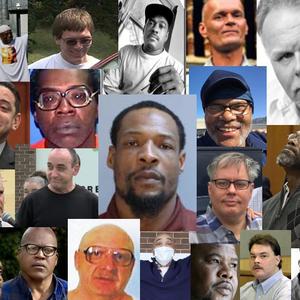
The Missouri Supreme Court is considering how to apply a rarely used state law intended to prevent wrongful executions. Marcellus Williams (pictured), a death row prisoner who maintains his innocence, could face execution if the state’s high court allows Governor Mike Parson to dissolve a board of inquiry that former Governor Eric Greitens formed to examine Mr. Williams’ innocence claims. Mr. Williams’ attorneys argue that state law requires the board to provide a report and recommendation to the governor, while Missouri Attorney General Andrew Bailey argues that Gov. Parson’s clemency authority allows him to disband the board of inquiry.
Marcellus Williams was convicted in 2001 for the 1998 murder of a local journalist, Felicia Gayle. St. Louis Police suspected that Ms. Gayle’s murder was a robbery gone wrong, and the crime scene details matched those of a crime that occurred just a few weeks earlier. The medical examiner at the time noted the similarities between the two cases and the local police chief told authorities they had identified a “prime suspect” whom they believed had killed before. Despite this lead, no arrests were made until the victim’s family offered a $10,000 reward for information leading to the killer’s arrest. A jailhouse informant, Henry Cole, went to police with a story about how Marcellus Williams, a former cellmate of his, confessed to killing Ms. Gayle. Cops later secured a second informant, Mr. Williams’ former girlfriend, Laura Asaro, who told the police that he had killed Ms. Gayle. Both Mr. Cole and Ms. Asaro were facing unrelated charges and stood to benefit from testifying for the state. Despite each informant’s story changing, Mr. Williams was charged, convicted, and sentenced to death for the murder of Felicia Gayle.
At trial, Mr. Cole and Ms. Asaro were essential to the state’s case against Mr. Williams. No physical evidence discovered at the crime scene could be connected to Mr. Williams, but Ms. Asaro claimed that he had scratches on his face the day following the murder. Scientific testing revealed no foreign DNA underneath Ms. Gayle’s fingernails. Mr. Cole told the jury that Mr. Williams had stolen clothing from the victim’s house to cover bloody stains, yet no clothes were determined to be missing from Gayle’s home. Additionally, bloody shoeprints at the crime scene were a different size than Mr. Williams’ feet and the fingerprints lifted at the crime scene were unusable, per the state’s standard, and were never given to the defense to analyze before being destroyed. Before Mr. Williams’ trial, the circuit court judge refused to allow DNA testing of some of the evidence collected from the crime scene. In 2015, Mr. Williams was given permission for DNA testing of the murder weapon, which revealed a male DNA profile inconsistent with that of Mr. Williams.
With this new evidence, Mr. Williams appealed to the Missouri Supreme Court, but they dismissed the new evidence and set an August 2017 execution date. The same day Mr. Williams was scheduled to be executed, he received a stay of execution from then-Missouri Governor Eric Greitens, who created a Board of Inquiry to review the DNA evidence. A five-member board consisting of retired judges was impaneled to “assess the credibility and weight of all evidence” in Mr. Williams’ case. In the order from Gov. Greitens, he indicated that the board must make a final report and recommendation to the governor “as to whether or not [Mr.] Williams should be executed, or his sentence of death commuted.”
Just a year after the board’s formation, Governor Greitens left office and current Governor Mike Parson took his place, advising the panel to continue their evidential inquiry. In June 2023, Gov. Parson issued an executive order rescinding Gov. Greitens’ order to establish the board of inquiry. In his statement, Gov. Parson said that “this board was established nearly six years ago, and it is time to move forward… We could stall and delay for another six years, deferring justice, leaving a victim’s family in limbo, and solving nothing. This administration won’t do that.”
A 1963 state law intended to prevent wrongful executions, allows the governor to not only grant reprieves, commutations, and pardons, but also provides the governor with the authority “to appoint a board of inquiry tasked with gathering information bearing on whether a person ‘condemned to death’ should in fact be executed.” The board “shall” issue final reports and recommendations to the governor. Attorneys for Mr. Williams are suing Gov. Parson, arguing that he violated state law when he dissolved the board before it could fulfill its statutory obligation to provide a recommendation in his case. They say Gov. Parson’s dissolution of the board before it could provide a report directly contradicts the legislation passed more than sixty years ago.
“All Mr. Williams is asking is for the board of inquiry to be able to complete its work and issue a report and recommendation, ensuring that at least one government entity finally hears all the evidence of his innocence,” said Midwest Innocence Project Executive Director Tricia Rojo Bushnell. “Mr. Williams has a right to this process that was started by Gov. Greitens precisely out of the concern that Missouri may execute an innocent person,” Ms. Bushnell added. Missouri Attorney General Andrew Bailey asked the Circuit Court to dismiss the lawsuit, but the court concluded that it should proceed. AG Bailey has now asked the state Supreme Court to weigh in on the validity of Mr. Williams’ lawsuit. AG Bailey told the court that Mr. Williams is attempting to “hijack” Gov. Parson’s clemency authority. Mr. Williams’ attorneys wrote to the Missouri Supreme Court that “the governor’s clemency power exists for the public good, not his own… As a result, a board of inquiry serves the public, not the governor, and the board ‘shall’ make a report and recommendation for the governor’s consideration before he makes a final clemency decision.”
The Conviction and Incident Review Unit in the St. Louis County Prosecuting Attorney’s Office has asked the state Supreme Court to not set an execution date for Mr. Williams for at least the next six months. The office is also investigating Mr. Williams’ case and needs to determine whether it will seek to vacate his sentence under Missouri law.
Jordan Smith, Crime Scene DNA Didn’t Match Marcellus Williams. Missouri May Fast-Track His Execution Anyway, The Intercept, January 14, 2024.M
Missouri
Dec 05, 2024
Hidden Casualties: Executions Harm Mental Health of Prison Staff
Innocence
Oct 23, 2024

The Limitations of DNA Evidence in Innocence Cases
Innocence
Oct 11, 2024
